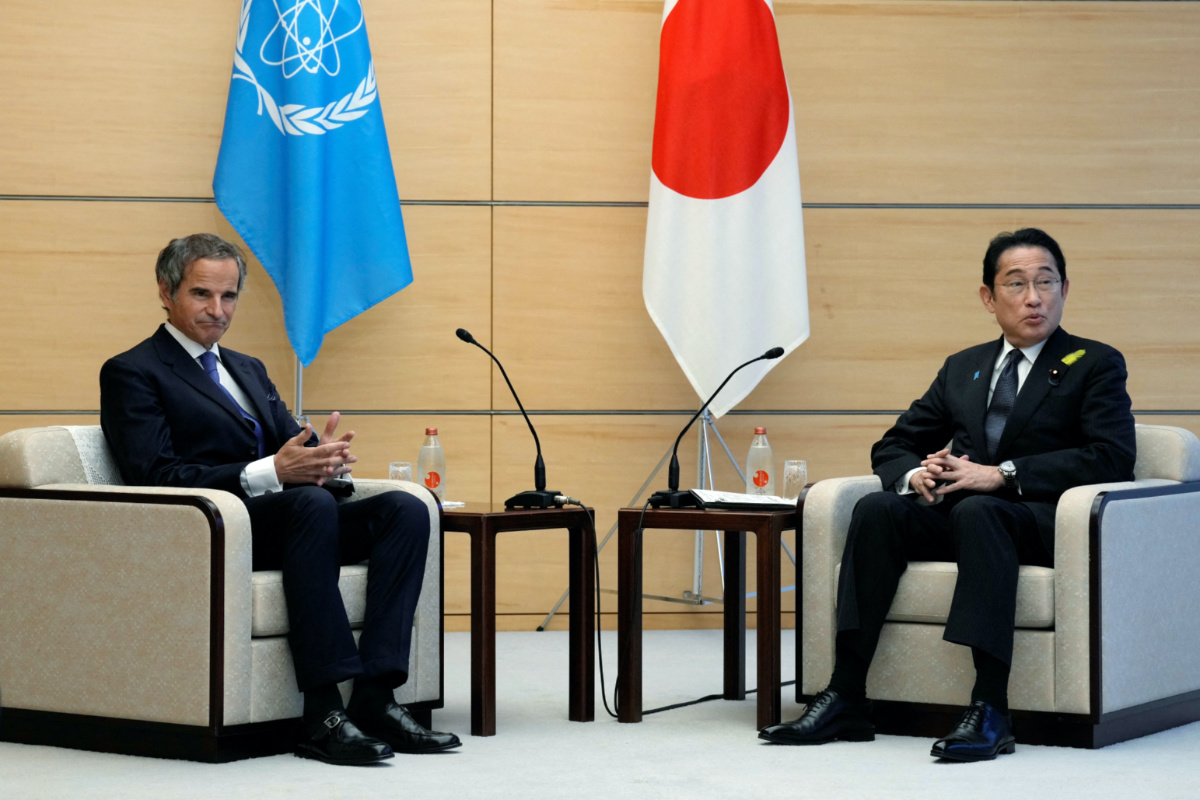Tokyo, Japan
Reuters
International Atomic Energy Agency chief Rafael Grossi on Wednesday vouched for the safety of Japan’s plan to release treated radioactive water from the Fukushima Daiichi nuclear power plant into the ocean after he surveyed the facility.
In a major milestone for the decommissioning of the power plant, destroyed in a massive earthquake and tsunami in 2011, the IAEA said on Tuesday that a two-year review showed Japan’s plans for the water release would have a negligible impact on the environment.

Rafael Mariano Grossi, director general of the International Atomic Energy Agency, left, speaks with Japanese Prime Minister Fumio Kishida, right, before presenting IAEA’s comprehensive report on Fukushima Treated Water Release to Kishida, at the Prime Minister’s office on Tuesday, 4th July, 2023 in Tokyo. PICTURE: Eugene Hoshiko/Pool via Reuters,
Japanese fishing unions have long opposed the plan, saying it would undo work to repair reputational damage after several countries banned some Japanese food products for fear of radiation. Japan regularly tests seafood from the Fukushima area and has found it to be safe.
Grossi said there were no pending issues, after surveying the wrecked power plant and feeding flounder raised in the treated radioactive water as proof of its harmlessness.
He also inaugurated an IAEA office on site that will monitor the release of the water, which is expected to take 30 to 40 years.
Still, the reality for people, the economy, and social perceptions may be different from the science, Grossi said, acknowledging the fears surrounding the water release.
“I don’t have a magic solution for the doubts and concerns that may exist, but we do have one thing…we are going to stay here with you for decades to come…until the last drop of the water has been safely discharged,” he said.
The Japanese Government is looking to start releasing water as early as August, the Nikkei reported on Wednesday.
The plan still needs official approval from the national nuclear regulatory body, which is expected on Friday.
Criticism abroad
Some neighbouring countries have also raised concerns over the threat to the environment, with Beijing emerging as the biggest critic.
Chinese foreign ministry spokesman Wang Wenbin on Wednesday criticised the move towards discharging the water and threatened action if the plan should move ahead.
“The relevant Chinese government departments will strengthen the monitoring of the ocean environment and inspection of marine products import, so as to ensure the health and food security of the public,” he said, but declined to give specific details on what sort of action the government would take.
China bans seafood imports from 10 prefectures in Japan, including Fukushima and the capital Tokyo. Seafood imports from other prefectures are allowed but must pass radioactivity tests and have proof of being produced outside the 10 banned prefectures.
The United States welcomed the IAEA report on Wednesday. State Department spokesperson Matthew Miller praised Japan’s cooperation with the IAEA and its “science-based and transparent process”.
We rely on our readers to fund Sight's work - become a financial supporter today!
For more information, head to our Subscriber's page.
To assuage international concerns, Grossi said he will follow up his visit to Japan with a tour of South Korea and the Pacific Islands to explain the water will have no negative impact on the environment.
Prime Minister Fumio Kishida said on Tuesday his country would aim to gain acceptance both domestically and internationally with the IAEA’s endorsement.
Kishida may meet South Korean President Yoon Suk Yeol to explain the water release, when attending the NATO summit meeting in Lithuania next week, the Mainichi newspaper said on Wednesday.
Japan’s foreign minister, Yoshimasa Hayashi, is also preparing to meet his Chinese and South Korean counterparts mid-July on the sidelines of a South-East Asia group summit, the Yomiuri newspaper reported on Wednesday.
Japan says the water has been filtered to remove most radioactive elements except for tritium, an isotope of hydrogen that is difficult to separate from water. The treated water will be diluted to well below internationally approved levels of tritium before being released into the Pacific.
– With reporting by CHANG-RAN KIM in Tokyo, and YEW LUN TIAN in Beijing, China.






